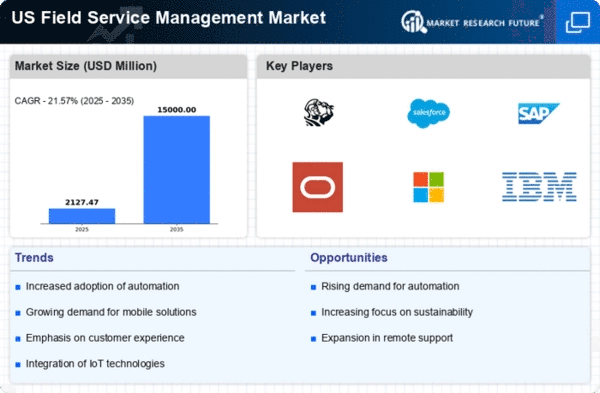Expansion of Remote Work Capabilities
The field service-management market is witnessing a shift towards remote work capabilities, driven by advancements in communication technologies. The ability to manage field operations remotely allows organizations to maintain service continuity while reducing overhead costs. Tools such as cloud-based platforms enable real-time collaboration among teams, enhancing productivity and responsiveness. This trend is particularly relevant in industries where field technicians require immediate access to information and support. As remote work becomes more entrenched, the field service-management market is expected to expand, with companies investing in solutions that facilitate remote management and oversight of field operations.
Increased Regulatory Compliance Requirements
The field service-management market is also influenced by the need for compliance with various regulatory standards. Industries such as healthcare, utilities, and telecommunications are subject to stringent regulations that mandate accurate reporting and accountability. As organizations navigate these complexities, they are increasingly turning to field service management solutions that ensure compliance and streamline reporting processes. This trend is particularly evident in sectors where non-compliance can result in hefty fines, potentially reaching millions of dollars. Consequently, the demand for robust field service-management systems that facilitate compliance is expected to rise, further propelling market growth. Companies that can effectively manage compliance will likely gain a competitive edge.
Rising Demand for Enhanced Customer Experience
In the field service-management market, there is a growing emphasis on delivering superior customer experiences. Companies are recognizing that customer satisfaction directly influences retention and revenue. As a result, service providers are investing in tools that facilitate better communication and transparency with clients. For example, implementing customer portals and mobile apps allows clients to track service requests in real-time, which can lead to a 30% increase in customer satisfaction scores. This focus on customer-centric service delivery is likely to drive market growth, as organizations strive to differentiate themselves in a competitive landscape. The field service-management market is thus evolving to prioritize customer engagement and satisfaction.
Growing Importance of Sustainability Initiatives
Sustainability is becoming a critical driver in the field service-management market as organizations seek to reduce their environmental impact. Companies are increasingly adopting eco-friendly practices, such as optimizing routes to minimize fuel consumption and utilizing energy-efficient equipment. This shift not only aligns with corporate social responsibility goals but also appeals to environmentally conscious consumers. Research indicates that businesses implementing sustainable practices can reduce operational costs by up to 25%. As sustainability becomes a priority, the field service-management market is likely to see a surge in demand for solutions that support green initiatives, thereby enhancing brand reputation and customer loyalty.
Technological Advancements in Field Service Management
The field service-management market is experiencing a notable transformation due to rapid technological advancements. Innovations such as artificial intelligence (AI), machine learning, and mobile applications are enhancing operational efficiency. For instance, AI-driven analytics can optimize scheduling and resource allocation, potentially reducing operational costs by up to 20%. Furthermore, the integration of augmented reality (AR) tools allows technicians to access real-time information, improving first-time fix rates. As organizations increasingly adopt these technologies, the field service-management market is projected to grow significantly, with estimates suggesting a compound annual growth rate (CAGR) of around 15% over the next five years. This growth is indicative of a broader trend towards digital transformation within service industries.
















